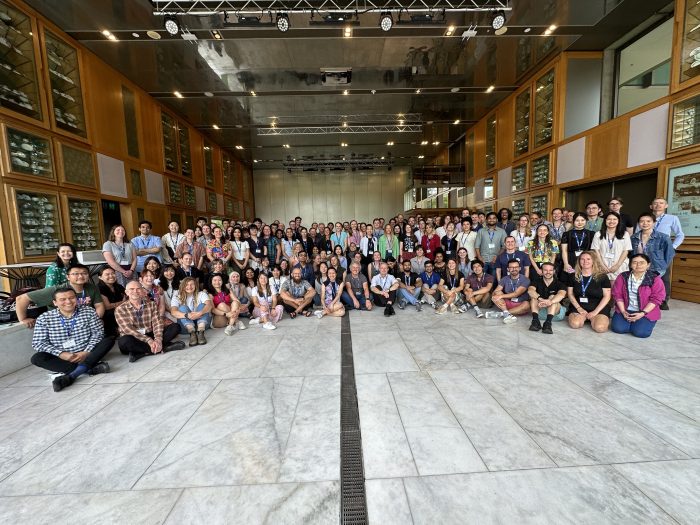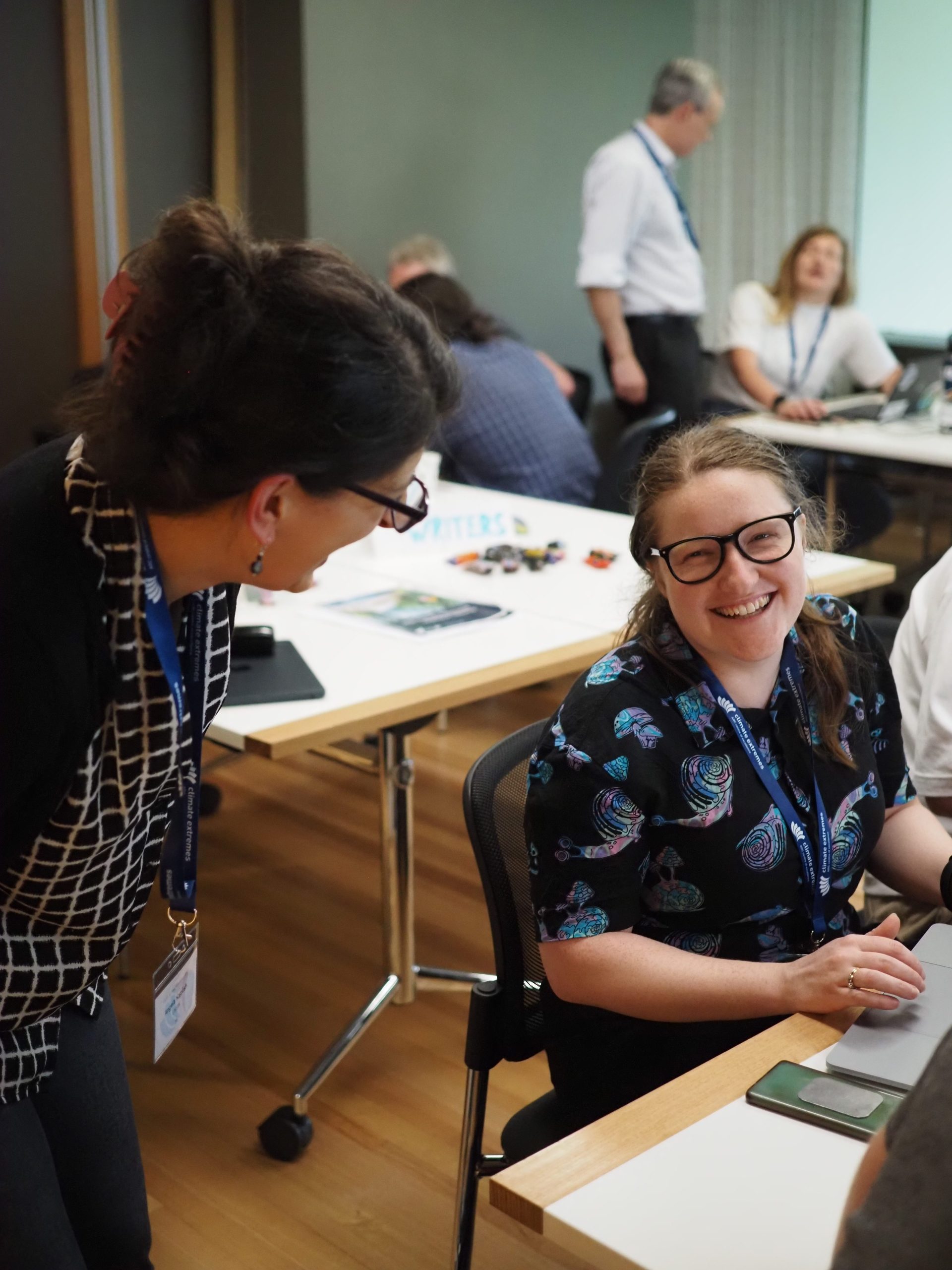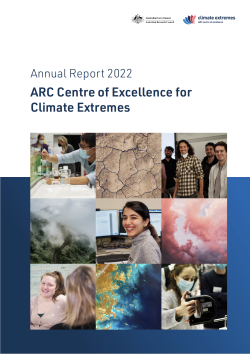The Australian Research Council (ARC) Centre of Excellence for Climate Extremes has a robust and efficient governance structure. Our governance model ensures participative decision-making by all Centre members via the following: our committees for early career researchers, infrastructure, diversity and culture, seminars, and engagement and impact. Each committee presents recommendations to the Centre Executive and provides updates to monthly Chief Investigator meetings. In addition to these internal structures, the Centre of Excellence receives guidance and strategic advice from its Advisory Board.

Centre Advisory Board
The ARC Centre of Excellence for Climate Extremes is overseen by an Advisory Board chaired by distinguished scientific leader Dr Tony Press. The Board provides strategic oversight and advice to the Centre and monitors its performance against its stated Key Performance Indicators. The Advisory Board met once in 2023, on 1 November.
Advisory Board Members in 2023
Dr Tony Press, Adjunct Professor, UTAS, Antarctic Climate and Ecosystems Cooperative Research Centre (Chair)
Dr Tony Press is an Adjunct Professor at the Antarctic Climate and Ecosystems Cooperative Research Centre, where he served as its chief executive officer from 2009 to 2014. Dr Press has had a long career in science, natural resource management, public administration and international policy.
Dr Press chaired the Antarctic Treaty’s Committee for Environmental Protection (CEP) from 2002 to 2006. He was Australia’s representative to the CEP and alternative representative to the Antarctic Treaty Consultative Meetings from 1999 to 2008. He was Australia’s Commissioner for the Convention on the Conservation of Antarctic Marine Living Resources from 1998 to 2008.
Dr Jaci Brown, Research Director, CSIRO Climate Science Centre
Dr Jaci Brown is the Research Director for the Climate Science Centre in CSIRO’s Ocean and Atmosphere Business Unit. Dr Brown’s research has spanned tropical oceanography, climate projections, fisheries, high-resolution ocean defence tools and seasonal atmospheric processes in Australia. Her previous role was as a team leader in CSIRO’s Agriculture and Food Business Unit. There, Dr Brown led the Weather and Climate Decisions team. This team focused on delivering actionable weather and climate knowledge to stakeholders.
Ian T. Dunlop, Independent Advisor & Commentator, Climate Change & Energy
Ian Dunlop is a Cambridge-educated engineer, formerly a senior executive in the international oil, gas and coal industries. He chaired the Australian Coal Association in 1987-88. From 1998 to 2000 he chaired the Australian Greenhouse Office Experts Group on Emissions Trading, which developed the first emissions trading system design for Australia. From 1997 to 2001 Ian was chief executive officer of the Australian Institute of Company Directors. He has a particular interest in the interaction of corporate governance, corporate responsibility and sustainability.
Ian is a director of Australia 21, a fellow of the Centre for Policy Development and a member of The Club of Rome. He advises and writes extensively on governance, climate change, energy and sustainability.
Danielle Francis, Manager Liveable Communities, Water Services Australia
In her 20 years in the Australian water industry, Danielle has led communications, regulatory, pricing, stakeholder and strategy portfolios to help the industry deliver valued services to the community.
Today, as Water Services Australia’s Manager Liveable Communities, Danielle oversees national and regional collaboration, learning and advocacy on water security, integrated water cycle management and climate change. She also develops initiatives to promote understanding and adoption of circular-economy principles in the water industry. In addition, Danielle leads work to promote recognition and integration of Indigenous water values and knowledge in water management and water services.
Dr Greg Holland, Willis Senior Scientist Emeritus, National Center for Atmospheric Research, Boulder, USA
Dr Greg Holland is Willis Senior Scientist Emeritus at the US National Center for Atmospheric Research (NCAR). He is also a member of the Zurich Insurance Advisory Council for Catastrophes and a key stakeholder for the European ISIpedia. Dr Holland was previously director of NCAR’s Earth System Laboratory and the Capacity Center for Climate and Weather Extremes. He has served on a number of committees and review boards for the National Oceanic and Atmospheric Administration, the US National Academies and NASA — and he chaired the Tropical Meteorological Program of the World Meteorological Organization for 12 years.
Dr Holland’s current research focuses on climate variability and change and its effect on weather and climate extremes. He holds a PhD in Atmospheric Science from Colorado State University. He is a fellow of both the American Meteorological Society and the Australian Meteorological and Oceanographic Society.
Professor Dane McCamey, Pro Vice-Chancellor (Research), UNSW
Professor Dane McCamey is Pro Vice-Chancellor (Research) at the University of New South Wales, Sydney. His research interest is in condensed-matter physics, in particular the role that spin (a quantum property of subatomic particles) plays in the function of optoelectronic materials and devices. His research spans from fundamental investigation of quantum properties through to applications in photovoltaics and quantum technologies. Prior to his current role, Prof McCamey was deputy dean of Research and Enterprise for UNSW Science and also served as deputy director of the ARC Centre of Excellence in Exciton Science.
Dr Jon Petch, UK Meteorological Office
As the head of UK Meteorological Office Science Partnerships, Dr Jon Petch is responsible for the UK Met Office’s national and international relationships with other science organisations. He has worked on physical modelling and parameterizations since joining the UK Met Office in 1997. From 2009, in parallel with his science research, Dr Petch has also managed various science collaborations on behalf of the UK Met Office. He continues to carry out research in areas related to atmospheric processes and parameterizations, and he leads the Global Atmospheric System Studies project.
Matthew Riley, Director, Climate and Atmospheric Science, NSW Office of Environment and Heritage – Department of Primary Industries and the Environment
Matthew Riley is Director of Climate and Atmospheric Science at the NSW Office of Environment and Heritage (OeH). He is also the Director for the NSW and ACT Regional Climate Modelling Project (NARCliM), and leads OEH’s Climate Change Impacts research program. In addition, he is responsible for the operation of the 43 monitoring stations of the NSW Air Quality Monitoring Network and leads the NSW Government’s air quality research program. Matthew has over two decades of experience in urban meteorology, climatology and air-quality measurement.
Anthony Swirepek, Acting Director, Geological and Bioregional Assessments, Department of the Environment and Energy
Anthony Swirepek is a highly experienced public servant, having held numerous senior roles in the federal Department of Environment over many years. His previous positions in that department have included director of the Climate Science team, director of the Research program and director of Bioregional Assessments. Anthony has represented the Department on the advisory boards of multiple scientific research organisations and brings a wealth of experience to help facilitate collaboration between science and policy.
Dr Bertrand Timbal, Head of Research, Bureau of Meteorology
Dr Bertrand Timbal moved to Australia and the Bureau of Meteorology in 1996, after completing his PhD at the French National Met Service (Meteo-France) in 1994. After a three-year stint leading the Climate branch in the Centre for Climate Research Singapore, Dr Timbal re-joined the Bureau of Meteorology in 2020 as the General Manager for the research program, Science and Innovation Group. In this role, he leads a program of 130 scientists, support scientists and science managers delivering along the four objectives of the Bureau of Meteorology’s Research and Development Plan.
Centre Executive
The Centre Executive is composed of the Centre Director, who is responsible for day-to-day leadership of the ARC Centre of Excellence for Climate Extremes and its research; the Deputy Director; the Chief Operating Officer; the Graduate Director; the Manager of the Computational Modelling Systems team; and the leaders of the Engagement and Impact team.
Each of the Centre’s research programs has a pair of co-leaders who set and monitor yearly and longer-term research priorities. All Chief Investigators meet monthly to discuss Centre business and cross-nodal research activity and initiatives.
Centre Committees
To maximise the Centre’s effectiveness as a cohesive entity, we have established three key committees that report to the Centre Executive, each with an important and specific remit to enhance collaboration across the Centre and drive focus in key areas of our Centre strategy; namely, equity and diversity, outreach and pathways-to-impact and infrastructure and technology.

Diversity and Culture Committee
Chairs: Melissa Hart (UNSW) and Stephen Gray (UNSW)
Members: Hooman Ayat (UniMelb), Isabelle Greco (UNSW), Fadhlil Rizki Muhammad (UniMelb), Andy Pitman (UNSW), Jenny Rislund (UNSW), Martin Singh
(Monash) and Andrea Taschetto (UNSW)
The Centre of Excellence is committed to providing an unrivalled working environment for its students and staff. Consequently, we’re implementing measures that enhance the diversity of our staff and student populations and proactively ensuring we build and maintain an equitable culture.
The Diversity and Culture Committee provides advice and recommendations to the Centre Director and Centre Executive on matters pertaining to equity, diversity and Centre culture, including mental health and wellbeing. The committee leads Centre-wide initiatives and drafts policies and procedures within its sphere of influence. The committee’s activities are based on research and on benchmarking of best practice in the equity, diversity and culture landscape in Science, Technology, Engineering and Mathematics and in higher education generally.
Infrastructure Committee
Chair: Paola Petreli (UTAS)
Members: Gab Abramowitz (UNSW), Dietmar Dommenget (Monash), Jason Evans (UNSW), Andy Hogg (ANU), Neil Holbrook (UTAS)
The Infrastructure Committee’s primary role is to aid the Computational Modelling Systems team in the prioritisation and delivery of the services it provides. This includes facilitating discussion and decision-making around which modelling systems and data sets should be considered in or out of scope, as well as identifying emerging modelling systems or data sets that offer new opportunities for the Centre. The committee is also tasked with helping the Computational Modelling Systems (CMS) team allocate, compute and store resources in respect to Centre research programs – particularly where there are competing requests – as well as liaise with National Computational Infrastructure and other relevant national infrastructure bodies.
These roles are intended to help maintain strong communication between Centre researchers and the CMS team, as well as support the latter in prioritising competing requests for its time.
Engagement and Impact Committee
Chairs: Angela Kaplish and Jonathan Brown (UNSW)
Members: Nerilie Abram (ANU), Ailie Gallant (Monash), Amelie Meyer (UTAS), Kim Reid (Monash), Zoe Gillett (UNSW), Alice Wilson (Monash)
The Engagement and Impact Committee at the Centre of Excellence brings together some of Australia’s most talented policymakers, media and communications specialists, science communicators, content makers and designers, and more to ensure that the essential science of climate extremes is heard by the people who need to know.
The committee advises and collaborates with the Centre’s Engagement and Impact team to deliver training, resources and opportunities for Centre researchers to share their work and expertise with government, industry and the community.

Centre Operations Team
The transformative research that the Centre of Excellence continues to deliver is supported by a dedicated team of professional staff. Stephen Gray (formerly chief operations officer) left
the Centre mid-2023 for a well-deserved break and to pursue new opportunities. Vilia Co, the Centre’s Finance Manager, has stepped in as Chief Operations Officer. The operations team is further comprised of Senior Project Officer Jenny Rislund (UNSW), Finance Officer Susana Widjaja (UNSW), Node Administrator Sushila Desai (UTAS), Mary Hapel (ANU), Silvana Katragadda (Monash), Taira Malby-Freckleton (UNSW) and Simon Parsons (UniMelb). In 2023, the following departed: Project Officer Ellen Hooper (UNSW), Node Administrator Sook Chor (Monash), Christine Fury (UTAS) and Carmen Tucker (ANU).
Leadership Development
We are strongly committed to providing leadership training, mentorship, guidance and opportunities for all ARC Centre of Excellence for Climate Extremes researchers, including our students and early career researchers (ECRs), along with our professional and technical staff.
Our Centre is unique among Australian Centres of Excellence in appointing a dedicated, full-time senior Graduate Director to build a fully integrated leadership and professional development program for our staff and students.
What our Centre offers far exceeds a typical ‘mentoring program’ in scale and ambition. We provide bespoke, end-to-end support for our graduate students and ECRs via the following:
- individual training-needs analyses;
- support for internships;
- a curated calendar of annual workshops addressing both scientific and professional skills and
- access to funding to support research visits to nodes and Partner Organisations, summer schools and other
career-enhancing opportunities.
Furthermore, our students and ECRs are represented via our Early Career Researcher Committee, with an ECR representative attending Chief Investigator meetings. That committee also organises professional development and training events, including dedicated events at the national Australian Meteorological and Oceanographic Society annual meetings. It helps facilitate dedicated ECR funding applications that enable our researchers to lead small projects that expand beyond the scope of their research programs.
Our Engagement and Impact team delivers training and creates opportunities for Centre researchers and students to boost their skills in government relations, policymaking, industry engagement, science communications, media commentary, public speaking and more. The team fosters engagement and impact in the next generation of leaders through long-term skill building. Our Centre fosters a culture of diversity and inclusion.
Our goal is to make the Centre a forward-thinking organisation that enables all staff and students, regardless of background, to do their best work in a professional and compassionate environment. Our equity plan is an ambitious document to guide the Centre’s efforts to fulfil our aim of being an exemplar in this space. We are serious about creating a respectful research environment for our diverse population of researchers, ensuring our staff and students can reach their full potential, and making a meaningful contribution to addressing historical prejudices and inequality in Science, Technology, Engineering and Mathematics disciplines.
Equity, Diversity and Inclusion
Our Centre fosters a culture of diversity and inclusion. Our goal is to make the Centre of Excellence a forward-thinking organisation that enables all staff and students, regardless of background, to do their best work in a professional and compassionate environment.
Our equity plan is an ambitious document to guide the Centre’s efforts to fulfil our aim of being an exemplar in this space. We are serious about creating a respectful research environment for our diverse population of researchers to ensure our staff and students can reach their full potential, and we are equally committed to making a meaningful contribution to addressing historical prejudices and inequality in the Science, Technology, Engineering and Mathematics disciplines.
Research Ethics and Intellectual Property
The ARC Centre of Excellence for Climate Extremes is committed to uncompromisingly high standards of professional conduct and rigour in all activities, including all aspects of our research.
Arguably, few disciplines receive as much public scrutiny as climate science. Accordingly, climate scientists have long embraced openness, accountability and an open-source approach to their work. This ensures the originality and reproducibility of research, adherence to proven methodological frameworks and rigorous data management practices. Adherence to Findability,
Accessibility, Interoperability and Reusability (FAIR) are normal practices in our field; indeed, we have been influential in driving this agenda, including in the production of recent Academy of Science reports. All new staff and students at the Centre of Excellence receive information on the ethical conduct of research as part of their Centre induction, and reminders of this responsibility are periodically circulated.
Intellectual property typically relates to inventions rather than discoveries. Research in our Centre is driven by our overarching goal to better understand the physical processes in the global climate system that contribute to extremes across scales of time and space. In other words, we are a Centre of Excellence focused primarily on discovery.
Globally, the climate science community has always worked from a foundational premise that all our work is open source and shared so that others may build on work that has preceded their own without restriction beyond the norms of attribution. Thus, code, data, models and so on are openly shared, and we benefit from this by having access to data and models that would be impossible for Australia to develop independently. By returning our contributions to that system, we provide the rationale for the rest of the world to maintain, in turn, open
access to their data and models. Accordingly, we place greater emphasis on proper data management — including publishing data and code — than on traditional notions of intellectual property.
This approach to open-source development of our models and tools that assist us in interrogating model output is explicit in the Centre’s inter-institutional agreement. The agreement also offers an intellectual property framework to follow if, at any point, the Centre develops an invention or product that meets the standard
definitions of intellectual property.
Consequently, intellectual property is a low priority in climate science — to raise this priority would break our capacity to engage internationally and access data and models developed by the climate science community.
However, we recognise that around half of our graduates leave academia and research to take positions in government or industry where intellectual property considerations may be material. We are developing an internal training module on intellectual property specific to the uniquely open-source approach taken by researchers in our field.
ARC Centre of Excellence for Climate Extremes – Annual Report 2023
From the Chair of the Advisory Board
Climate Science Leaders of the Future
Weather and Climate Interactions Research Program
Attribution and Risk Research Program
Ocean Extremes Research Program
Computational Modelling Systems
Governance, Management and our Commitment to Equity, Diversity and Inclusion

